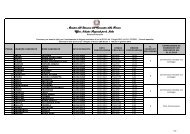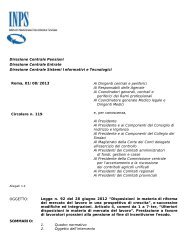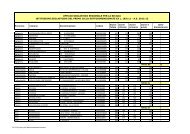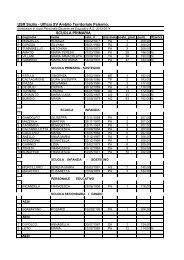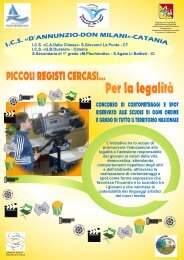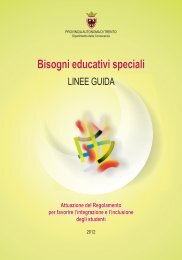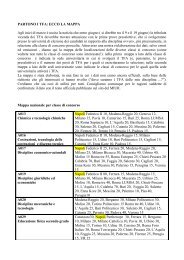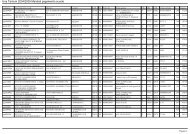Analisi - knowledge management case studies - Aetnanet
Analisi - knowledge management case studies - Aetnanet
Analisi - knowledge management case studies - Aetnanet
You also want an ePaper? Increase the reach of your titles
YUMPU automatically turns print PDFs into web optimized ePapers that Google loves.
The best expert is usually not the best moderator: other people may stop contributing if a<br />
moderator keeps adding comments to contributions from others.<br />
In larger, globally operating, networks three other roles are identified to support the<br />
community: a Subject Focal Point, moderating a part of the network, Local Coordinator<br />
energising all the members in his/her Operating Unit and a Global Coordinator acting as<br />
chairman and energiser for the total community. For an explanation of their necessity and<br />
their tasks is refered to the section called: Errore. L'autoriferimento non è valido per un<br />
segnalibro. - Implementing new organisational structure slowly.<br />
Appraisal system<br />
People do get recognised in a community by their contributions and by exposing their <strong>knowledge</strong>. This can<br />
occasionally contribute to financial rewards: a promotion can be triggered by the reputation contributors have built<br />
up in their community. It is obvious that if people are able to see these tangible benefits of sharing their<br />
<strong>knowledge</strong>, they will become more inclined to change their behaviour accordingly.<br />
By observations it was discovered that there is a culture arising within Shell, where people<br />
are saying ‘I didn’t invent this myself, I took ideas from him.’ Using ideas from others starts<br />
being encouraged and is popping up in some appraisal systems within individual operating<br />
companies. In these companies it is more beneficial for an individual to search for solutions<br />
already available, solicit suggestions and to admit that you have used someone else’s idea<br />
instead of developing your own solution. In some parts of the company the appraisal systems<br />
contain elements related to publishing information and to assisting others.<br />
Comparing individual Shell companies or business units merely on their own bottom line<br />
performance can be a hindering factor in <strong>knowledge</strong> sharing – sharing information reduces<br />
the competive advantage of an individual company in comparison to their peers within the<br />
Shell Group. This is to be compensated by including elements in the comparison as “total<br />
contribution to the Shell Group”, “implemented innovations by and from other companies”.<br />
Processes<br />
Best Practice Transfer<br />
In 1997 they tried a classical Business Process Benchmarking approach (some other oil<br />
companies work this way). Which means taking business processes of exploration and<br />
production, then step by step defining performance indicators for the various process parts,<br />
analysing the process parts of the various Shell operating companies and comparing them.<br />
Trying to explain the differences between good and bad performing operating companies,<br />
then describing the ways of work of the best performing operating companies and transfer<br />
this information to mediocre performing operating companies. This didn’t work at a global<br />
scale for several reasons; the formal taste of it all was not accepted by the operating<br />
companies.<br />
Later, in January 1998, they tried to follow a very simple approach to best practice transfer,<br />
learned from a network in the downstream sector of Shell. This network originated from the<br />
reorganisation of an Amsterdam based central office group of 10 people (engineers, former<br />
experts in the field themselves) which gave advise to colleagues working at Shell’s refineries<br />
around the world. The main reason for the need of such an office is that many colleagues in<br />
the Operating Units work remotely and may be one of the few skilled persons in the discipline<br />
on that place. In some <strong>case</strong>s there is no other colleague present in the vicinity of hundreds of<br />
kilometers. Royal Dutch/Shell Group of Companies decided to downsize its central offices<br />
and due to this decision the Amsterdam based group of experts had to do the same work with<br />
4 employees (40%) less. Therfor they came up with the idea to let the total community of<br />
engineers in the field help themselves. This was enabled by letting them send a question to<br />
the central office by E-mail or sometimes by a fax. The former expert at the central office<br />
became the moderator who ensured that the question was formulated in such a way that the<br />
engineers who were expected to answer it would interpret it correctly. The rephrased<br />
questions were sent by E-mail to all engineers in the field. If it took the engineers to long to<br />
answer the question, the moderator would start chasing for an answer, by calling people they<br />
expected to be knowledgable to answer it. Doing so, the problem-owner got his problem<br />
solved by his peers. Since all the questions and answers are collected in a worldwide<br />
accessible database, the next time the same problem occurs an engineer first looks for a<br />
solution in the database and therfor only needs to contact his peers via the moderator when<br />
CIBIT 42<br />
analisi-KM <strong>case</strong> <strong>studies</strong>.doc - 25/5/99




